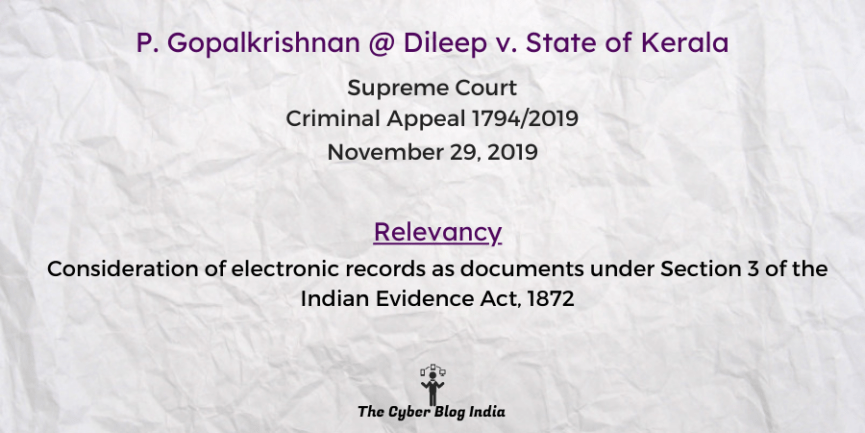P. Gopalkrishnan v. State of Kerala

P. Gopalkrishnan @ Dileep v. State of Kerala
(2020) 9 SCC 161
In the Supreme Court of India
Criminal Appeal 1794/2019
Before Justice A.M. Khanwilkar and Justice Dinesh Maheshwari
Decided on November 29, 2019
Relevancy of the case: Consideration of electronic records as documents under Section 3 of the Indian Evidence Act, 1872
Statutes and Provisions Involved
- The Information Technology Act, 2000 (Section 2(1)(t))
- The Code of Criminal Procedure, 1973 (Sections 173, 207)
- The Indian Evidence Act, 1872 (Section 3)
- The Indian Penal Code, 1860 (Section 29)
Relevant Facts of the Case
- The appellant is the eighth accused in the FIR. He offered the first accused a sum of ₹1.3 crores to commit sexual assault on the victim and record a video of the incident
- The video’s purpose was to extort money from the victim by putting her in fear of publicising it. Thus, he has conspired with the first accused.
- The prosecution has not provided the documents they have relied on, such as memory card contents.
- The appellant filed an application in the High Court seeking to direct the prosecution to submit a cloned copy of the contents of the memory card with the audio and video clippings along with the transcript of both male and female voices. The High Court rejected this application, and hence, the petitioner has filed its appeal.
Prominent Arguments by the Advocates
- The appellant has submitted that the contents of a memory card will qualify as a document under Section 3 of the Indian Evidence Act, 1872. Hence, a trial court cannot decline the accused’s request to provide him with a cloned copy of this electronic document.
Opinion of the bench
- Electronic record produced before the court is documentary evidence under Section 3 of the Indian Evidence Act, 1872. Therefore, electronic records under Section 2(1)(t) of the Information Technology Act, 2000 such as a memory card or pen drive shall be regarded as a document.
- A cloned copy cannot be given to the appellant because of the privacy issues of the complainant.
- Therefore, the appellant and his lawyer will receive the cloned copy to examine, subject to suitable directions to satisfy both sides.
Final Decision
- The court partly allowed the appeal.
